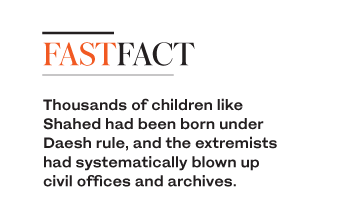MOSUL: When Shahed was born in 2015 her father tried to notify Iraq’s civil registry. The problem was, their city of Mosul was held by Daesh group and the office had been shut.
Three years later, 39-year-old Ahmed Aziz has yet to officially register his daughter’s birth, the certificate for which bears the seal of the so-called caliphate.
Under the late summer sun, the taxi driver braves a long queue outside Mosul’s reopened civil registry, hoping that by the end of the day Shahed’s name will finally appear in state records.
The little girl was born just a year after Daesh swept across the country, seizing swathes of territory including Iraq’s second city Mosul.
“The civil registry was closed,” said Aziz, holding the IS-stamped document issued by a hospital in Mosul.
But since Iraqi forces ultimately regained control of the city in July 2017 after a bloody months-long campaign, residents have flooded the city’s reopened offices.
Thousands of children like Shahed had been born under Daesh rule, and the extremists had systematically blown up civil offices and archives.
“I saw this massive rush to get to the public offices, so I preferred to wait a bit before going there too,” said Aziz.
As a result, his daughter does not yet officially exist.
During the Daesh’s reign, thousands of Iraqis who lived in areas controlled by Daesh virtually disappeared from state registers.
Some lost their identity documents as neighborhoods turned into battle zones, others as they fled the violence.
Many of those who remained were given documents from Daesh’s proto-state — ministries and courts created by the jihadists to register births, marriages, deaths and trade agreements alike.
None of that paperwork has been recognized by Iraqi authorities.
When Zein Mohammed got married in 2014, he and his soon-to-be wife had to present themselves at an IS court to seal the deal.
What should have been the best day of the now 29-year-old civil servant’s life was instead a test.
“I appeared in front of the judge with my fiancee — she was covered head-to-toe in black,” he told AFP.
Under Daesh rule, Mosul’s residents were forced to bow to the jihadists ultra-conservative demands.
Women were compelled to fully cover themselves in black veils and long robes, and civil cases were heard by courts that dealt out death sentences and corporal punishment for “sins..”
“The judge issued us a marriage certificate bearing the IS seal,” said Mohammed.
When Iraqi forces retook the city and courts reopened, he and his wife rushed to sign a new marriage contract.
Now, packed in among the crowd outside Mosul’s civil registry, Mohammed is hoping to finally regularize their marital status.
Iraqi civil servants are working around the clock to meet the massive demand, compiling files, verifying identities and registering official documents and certificates.
It is a titanic job, often slowed due to additional safeguards imposed by Iraqi security services in the former IS stronghold.
To weed out fake IDs and spot jihadists seeking to slip through the cracks, “intelligence services check each document,” head of Mosul’s registry office General Hussein Mohammed Ali told AFP.
But the added security measures have not hampered progress.
“More than a million certified documents and more than 2,000 passports have already been issued,” he said.
Mustafa Thamer, a 23-year-old student, is applying for his first passport even though he has no plans to travel soon.
“We say we must have a passport so that we can leave whenever we want,” he told AFP.
“We lived under IS occupation and we no longer trust the future of the city,” he said.
“Anything can happen in Mosul.”















